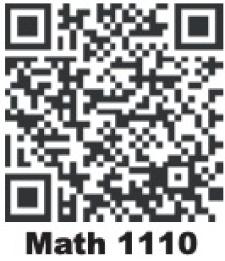Math 1110 Algebra II
PURPOSE OF MATH 1110
The purpose of all of the developmental mathematics courses is to support student success academically and beyond by advancing critical thinking and reasoning skills. Specifically in Algebra II, as a team, we will examine ways to use the algebraic structure provided to form strategies that are appropriate for the given problem and minimize the amount of work needed to arrive at a conclusion. In other words, use the structure to determine how to simplify an expression, factor a polynomial, or solve an equation efficiently.
Math 1110 in the Developmental Math Program in the Department of Mathematics at Western Michigan University is designed to sharpen algebraic skills and concepts in a function-based setting. Topics include linear functions, quadratic functions, composing and decomposing functions, inverse functions, logarithmic and exponential functions. The course emphasizes both the manipulation of symbols and an understanding of when manipulations are effective and appropriate.
This course serves solely as a prerequisite course. Math 1110 does not satisfy any general education or essential studies requirement.
Course Pack
There are two options for purchasing the pack.
- Purchase a math 1110 pack (algebra 2) directly from R J's Printing at 1001 Second Street Monday Through Friday 8am-5pm to purchase the pack.
Note that the Metro Bus 10 has a stop on Mills and Second which is minutes from R J's Printing.
- Use the following QR code to purchase online with a credit card and chose "in classroom" to have the pack delivered to you in class. Note that a credit card surcharge will be added, so your total will be $36.14.
COURSE INFORMATION
- Course learning outcomes
- Course syllabus
- How to use activity learning outcomes and goals to improve your grade
- Participation
- Presentations
- TI 83/84 directions (Note that YouTube is also a good source for directions with any type of calculator)
- Tips for success
EXAM DATES FOR SPRING 2026 BY EXAM NUMBER
- Friday, Jan. 30; 25 minutes
- Friday, Feb. 27; 50 minutes
- Monday, March 30; 50 minutes
- Monday, April 13; 25 minutes
If you are unable to attend class on any exam day you must notify Dr. Eisenhart (269) 387-4117 or (269) 873-8194 before the exam, so that she can assist you in a timely manner.
TENTATIVE SCHEDULE BY WEEK NUMBER
- Jan. 12 through Jan. 16: Properties of numbers and consequences for expressions and start exponent rules
- Jan. 19 through Jan. 13: MLK day, exponent rules
- Jan. 26 through Jan. 30: Using exponent rules to simplify expressions, solving equations, and Exam 1
- Feb. 2 through Feb. 6: Functions, function notation, expressions and practical meaning of coefficients and constants
- Feb. 9 through Feb. 13: Equivalent expressions, functions and equations, and the zero product property
- Feb. 16 through Feb. 20: Equivalent equations, extraneous solutions, and linear functions
- Feb. 23 through Feb. 27: Function composition and decomposition, domain and range (review on Desmos), and exponential functions and models and Exam 2
- March 2 through March 6: finish exponential functions, inverse functions, and Spirit Day
- March 9 through March 13: Spring break
- March 16 through March 20: Inverse functions and logarithms, rules of logarithms, and simplifying logarithmic expressions.
- March 23 through March 27: Solving exponential and logarithmic equations, and change of base
- March 30 through April 3: Exam 3, factoring trinomials by guess and check, and factoring trinomials by grouping
- April 6 through April 10: Solving quadratic equations, factoring trinomials using the ac method, solving quadratic and quadratic like expressions and equations, and cost, revenue and profit
- April 13 through April 17: Exam 4, solving exponential and logarithmic equations that involve factoring, three forms of a quadratic function, and characteristics of quadratic functions
- April 20 through April 24: Completing the square, quadratic formula, solving quadratic and quadratic like equations efficiently, and linear functions
- April 27 through April 29: Final exams
LAST DAY TO WITHDRAW
Monday, March 23 is the last day a student can process an official withdrawal from a class to avoid a failing grade.


